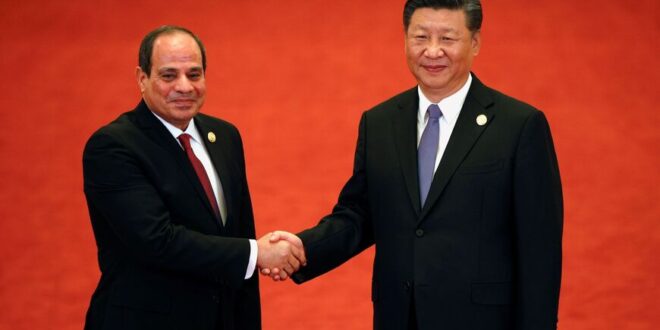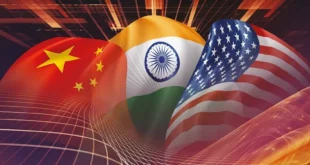Meeting on the sidelines of the Olympics, the Chinese president said Beijing and Cairo share ‘similar visions and strategies.’
During a meeting with Egyptian President Abdel Fattah al-Sisi in Beijing on the sidelines of the Olympic Winter Games, Chinese President Xi Jinping said that China and Egypt will continue to support each other.
“China and Egypt share similar visions and strategies in defending their own interests, pursuing common development, enhancing their people’s well-being and promoting fairness and justice in the world, as the world is undergoing changes unseen in a century,” Xi said Feb. 5, according to a statement by the Egyptian presidency.
The Chinese president also stressed the “comprehensive strategic partnership” between Beijing and Cairo that has become “a model of solidarity between China and Arab, African and developing countries.”
According to the Egyptian presidency’s statement, the meeting between the two heads of state also touched on issues of common interest for both countries, mainly the developments in the Grand Ethiopian Renaissance Dam (GERD), which have been at a stalemate since the last round of negotiations among Egypt, Sudan and Ethiopia. Tripartite talks were last held in early April 2021 but failed to reach an agreement.
The water issue, in general, and the GERD crisis in particular, are currently of major concern for the Egyptian government. Therefore, Xi’s statement raised questions about a shift in the Chinese position, especially after the speech last July of the permanent representative of China to the United Nations, Zhang Jun, during the UN Security Council extraordinary session on the GERD.
The Chinese delegate called for the resumption of negotiations under African Union auspices to complete the dam. Jun’s position dismayed Egypt, which maintains close ties with China, according to an article by Mustafa al-Sayed, a professor of politics at Cairo University, published on July 18, 2021, in al-Shorouk newspaper.
“Beijing is trying to stress that it is not a party to the crisis, perhaps because the Chinese feel that Cairo had reservations about the Chinese position after the UN session,” said Tarek Fahmy, another professor of politics at Cairo University, “But of course, China’s position is in line with the international approach to the GERD crisis regarding the need to return to the negotiating table once more.”
Since it is impossible to withdraw Chinese investments from Ethiopia, Fahmy told Al-Monitor, it was unlikely for Beijing to change its position on the dam issue. “The Chinese president’s remarks can be interpreted within the framework of Beijing’s keenness to maintain good relations with Cairo,” he added.
China views Ethiopia as an important political and economic ally. China is Ethiopia’s first trade partner, with a total trade exchange amounting to about $4.5 billion in 2018, and direct investments in Ethiopia reaching more than $2.5 billion in 2018, according to the independent Egyptian Center for Strategic Studies.
Meanwhile, Egyptian goods and services trade with China totaled $12.9 billion in 2020. China’s exports to Egypt amounted to over $12 billion, while its imports from Egypt for the same period stood at over $835 million, according to Han Ping, the economic advisor to the Chinese embassy in Cairo.
China is also implementing several projects in Egypt, including the first clean coal power station on the Red Sea coast, in addition to the tallest skyscraper in Africa as part of the comprehensive strategic partnership agreement signed by Egypt and China in 2014.
Nadia Helmy, an assistant professor of political science at Beni-Suef University, told Al-Monitor, “The political decision-makers in China tend not to fully engage in the GERD crisis between Egypt, Sudan and Ethiopia.” Egypt, which suffers from water scarcity, views the GERD as an existential threat, as it fears that the dam would reduce its share from the Nile waters. “While Sudan shares the same concerns with Egypt, Ethiopia considers the dam as a means to achieving development through power generation,” she said.
Helmy added, “China is also an upstream country for several international rivers, which share borders with other countries. Hence, the Chinese fear that any mediation in the GERD crisis in favor of Egypt would weaken its stance as an upstream country,” especially on the Mekong River.
“Moreover, China is also embarking on the construction of the largest energy production dam in the world,” Helmy added, in the Tibet Autonomous Region in China, along the Brahmaputra River, which is expected to raise problems with India and Bangladesh.
 Eurasia Press & News
Eurasia Press & News




